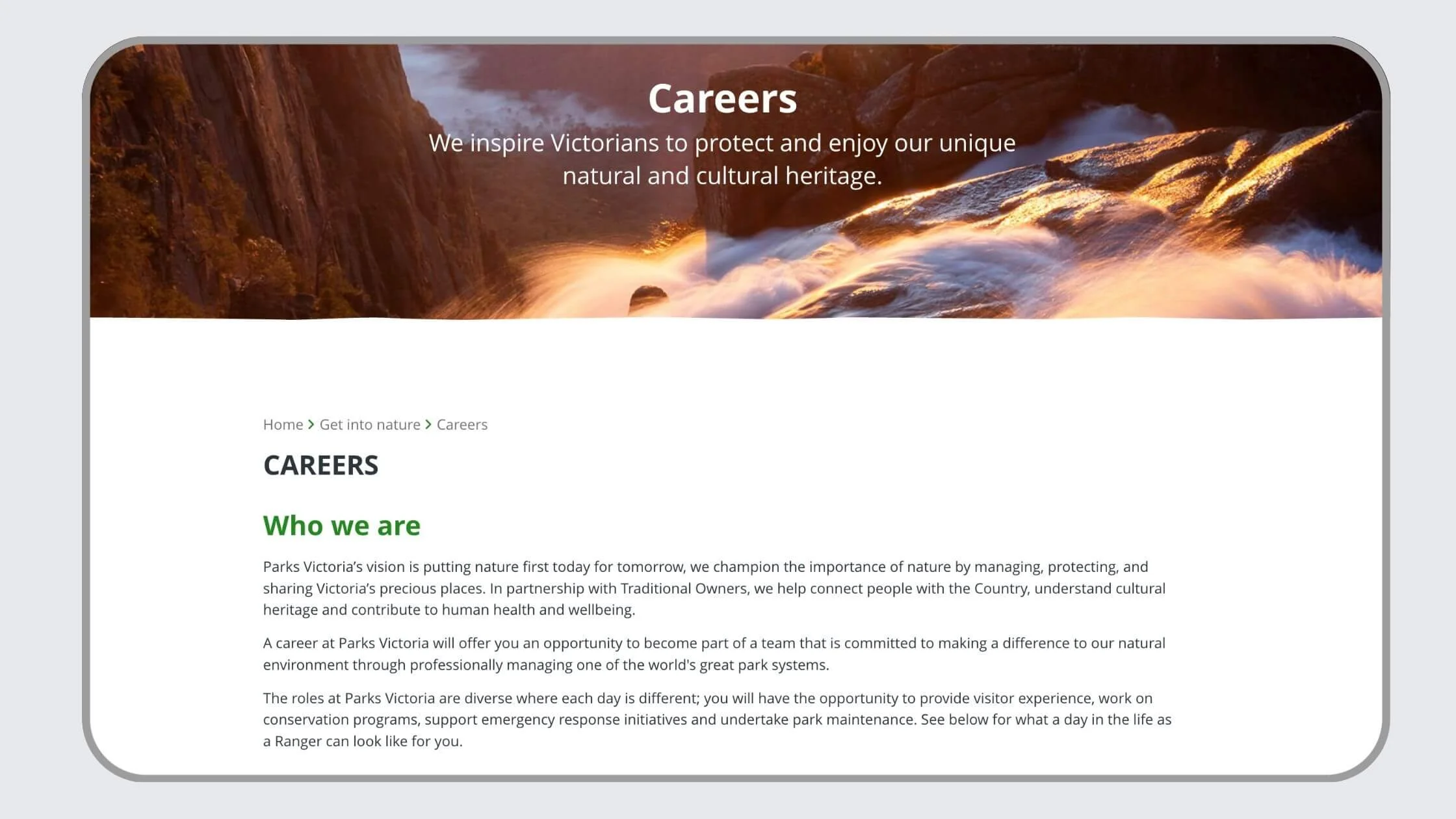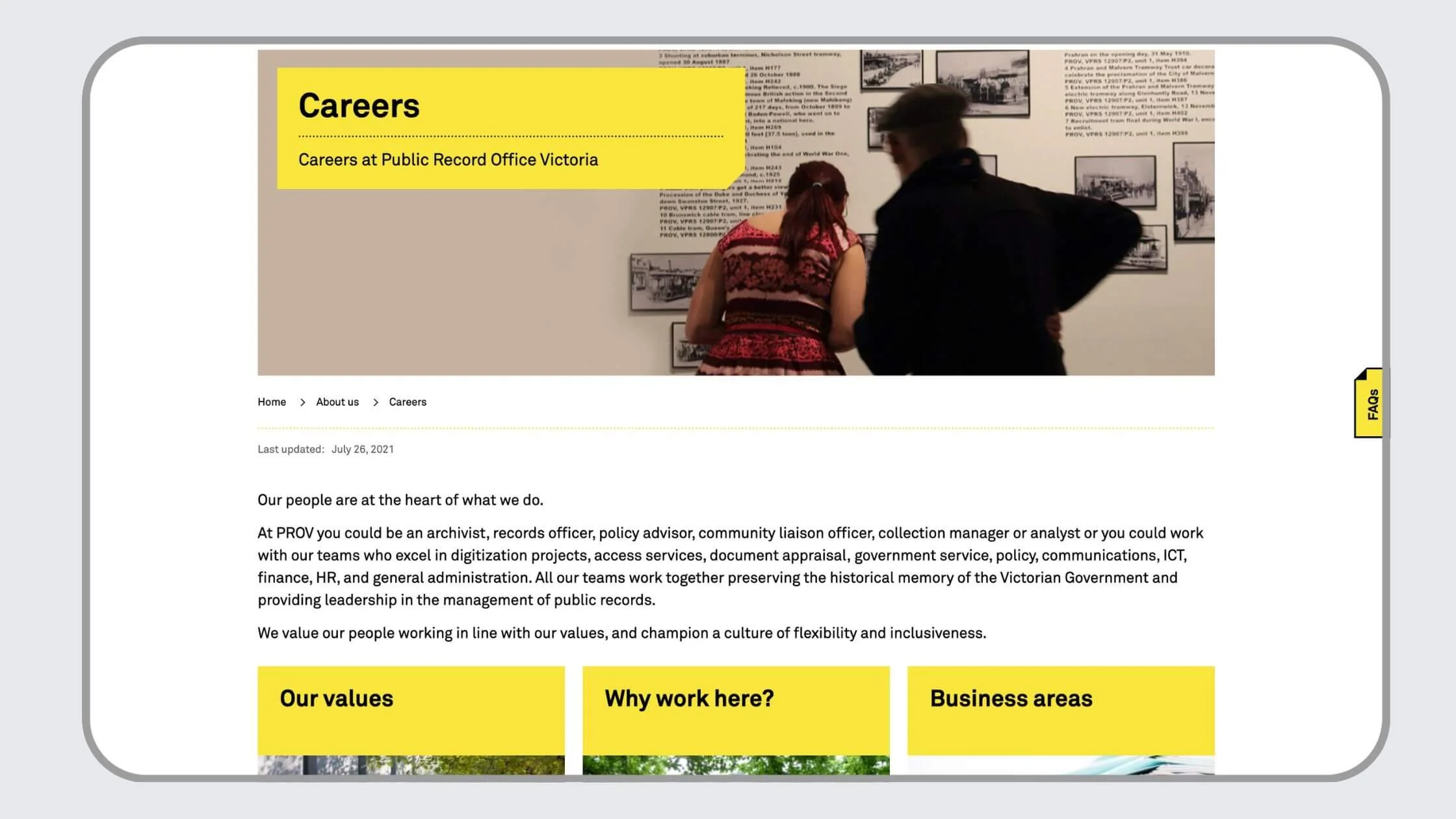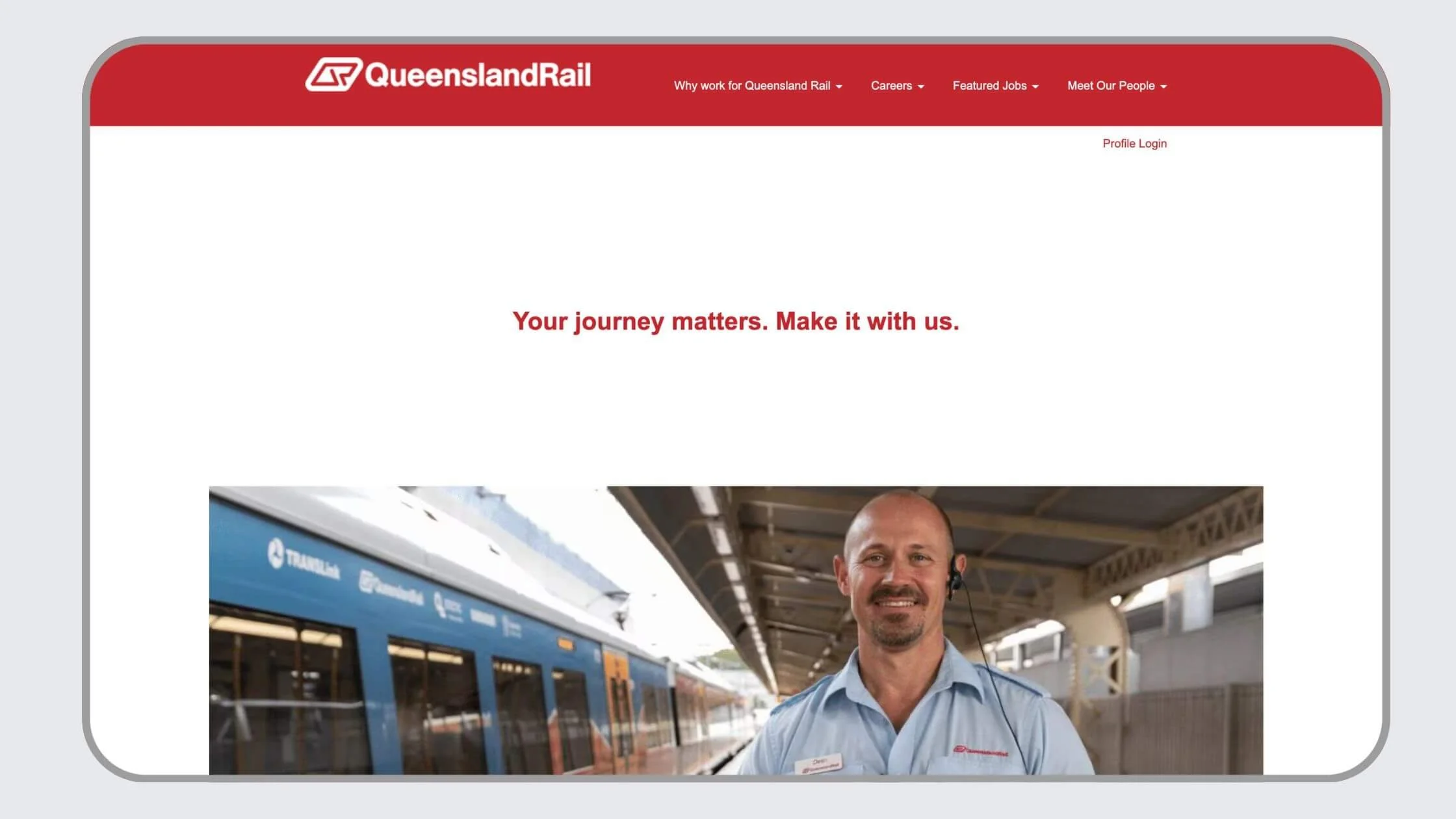The public sector EVP paradox: rich in purpose, poor in storytelling
Public sector organisations hold something the private sector would quietly trade half their budget for. They hold real purpose, not the sort stitched together in an offsite workshop but the kind you can feel in your chest when a ranger points out a wallaby to a child for the first time, or when a nurse steadies a frightened family in the middle of the night, or when a planner realises they have shaped a street that will keep strangers safe for decades. It is the kind of purpose that exists whether you articulate it or not, humming away in the background like a gentle engine.
Yet, when you read most public sector EVPs, you would never know any of that was true. They often sound muted, careful, strangely beige, like someone tried to describe the Northern Lights using the colour palette of a tax return. This isn't a failing, it is simply the natural outcome of systems designed for caution, accuracy, and political neutrality rather than emotional clarity.
And yet, it is entirely fixable.
Because people come into government for all kinds of reasons. Some follow a calling. Some arrive for stability, predictable hours, or a clearer career structure. Some fall into it by chance, then discover they care about the work. But for many people, even if they would never say it quite so dramatically, something in the mission matters. Something about fairness or community, or the long arc of impact, pulls them more than the immediacy of private sector gains. They make the trade-offs with clear eyes, and somewhere deep down they hope their organisation names the choice and honours it.
This is the quiet paradox. The private sector works incredibly hard to manufacture even a teaspoon of this emotional clarity, yet the public sector often underplays it in the very place designed to articulate why someone would want to join. Purpose exists in abundance but is rarely shaped into language that resonates.
When purpose goes unnamed, the EVP falls back into the comfortable fog of generic phrasing, and the rich meaning behind the work gets lost.
Why public sector EVPs feel strangely flat, even when the purpose is rich
Among the recurring patterns, one stands out. Many public sector EVPs are written almost entirely through the lens of duty. They describe what you will contribute, uphold, or deliver. They talk about responsibility, obligation, and community service, which are all true and important, but without the emotional return, it becomes one half of a story.
You see it everywhere.
Victorian Treasury: "Contributing to the long-term economic outlook of the State."
NSW Health: "Join the team enriching health in millions of ways every day."
Parks Victoria: '“We inspire Victorians to protect and enjoy our unique natural and cultural heritage.”
These lines are correct, but they are not deeply felt. They describe the outer shell of the work while leaving the inner experience unseen. Duty is noble, but when duty is the only note played, the EVP starts sounding like an obligation rather than an invitation.
Even organisations whose missions are naturally evocative sidestep the emotional truth. Parks Victoria carries the kind of meaning that private companies salivate over, yet the EVP reads like a conference brochure rather than an expression of the wonder, stewardship, Country, biodiversity, and childhood memory that define its purpose. The meaning is there, it simply never makes it to the page.
And when that emotional centre is absent, everything begins to blur. Career opportunities, professional development, supportive teams, diversity, a chance to give back. Remove the logo and it becomes almost impossible to tell one agency from another.
A possible trap: trying to speak to everyone by speaking to no one
This flattening isn't caused by laziness or lack of insight. It is often a by-product of sheer organisational scale. A private company might be speaking to four or five broad job roles. A public sector EVP must speak to midwives, economists, ecologists, call centre staff, GIS officers, cultural heritage specialists, school nurses, fire planners, data analysts, rangers, psychologists, and people whose job titles take a full breath to say. If you try to appeal to everyone at the task level, abstraction is the only safe outcome.
But the specificity that matters in an EVP is not role-level specificity, it is identity-level specificity.
Because while public sector workers have wildly different skill sets and days, many share deeper motivations. They value fairness and community. They appreciate stability. They seek work that contributes to the public good. They tolerate complexity because they care about integrity. They care more about the long-term arc of impact than the short-term optics of it. Even those who join for more practical reasons often find themselves anchored by meaning over time.
Public Record Office Victoria shows what this looks like in practice.
Their EVP lists archivists, records officers, policy advisors, digitisation experts, ICT specialists, finance teams, and general administrators — a staggering range of work. Yet they unite everyone under a single meaningful centre: All our teams work together preserving the historical memory of the Victorian Government. That's identity-level specificity. It doesn't try to describe what a digitisation expert does versus what a policy advisor does. It describes why it matters for both of them to show up for work on a Monday.
But while this is a step forward, for me, they stop just before the emotional truth emerges. Why does preserving collective memory matter? Because without it, governments repeat mistakes. Communities lose their stories. Injustices can be denied or forgotten. Rights can't be proven. The vulnerable lose their paper trail to justice. Memory isn't preservation for its own sake, it's how we hold power accountable, how we honour what came before, how we shape what comes next. That's what would make someone choose PROV over another quiet desk job. The foundation is there. I believe it just needs to go one layer deeper, from what the work is, to why it matters.
This deeply felt shared identity is the foundation of a resonant EVP.
The glimmers: where agencies almost land it, and the gold hiding underneath
Once you start viewing EVPs through this lens, you can see where organisations brush up against something powerful, but somehow hold back just before the words land in a truely human way.
Queensland Rail begins with the lovely phrase, "Your journey matters. Make it with us," which is one of the strongest emotional openings in the public sector I’ve found. But beyond vague mentions of motivation, teamwork and forward thinking, the real anchoring proof never arrives, and the promise floats away.
VicRoads touches on something real with keeping Victorians moving safely. We can all connect to this: roads are how a child gets to school, how an ambulance reaches someone in time, how regional communities stay connected. That's genuinely meaningful work.
But the EVP wraps that kernel of truth in generic mentions of innovation, progress, and people ready to make a difference until the emotional core gets smothered. Strip away the corporate vocabulary, and there's something powerful underneath. The meaning is there. It just needs permission to speak plainly.
NSW Health, with its enormous mission and intensely human work, writes almost exclusively in structural language. It gestures towards variety and impact, but never tells you what it feels like to help someone through a hard day.
Parks Victoria sits on the emotional jackpot of the entire sector, yet its EVP reads tidy and neutral, as if someone gently removed all the colour in the name of safety.
EPA Victoria has a noble mission, but the tone remains carefully instructional.
But then, occasionally, something shines through. Yarra Valley Water's change maker at the actual source is strong, grounded, and clear.
It promises something government workers crave but may not always feel: that their impact is upstream enough to matter, early enough in the system for the effects of their work to ripple outward rather than be caught up in some bureaucratic dam. It has identity, attitude, and a sense of heart.
These glimpses show the gap is not creativity or competence. It is courage, consistency, and the will to let a little more truth into the room.
Here’s one more example from my past that proves the whole thing is possible
i spent time in New Zealand as a teen, and there's a Police recruitment ad from the 1990s that has stayed with me for decades. They remade it in 2025, and it still makes me cry. No car chases, no heroics, no action-movie music. Just a team helping vulnerable people with patience, tenderness and pragmatism. It shows the reality of the work: care, connection, weight, purpose. That's what the job actually is, underneath all the operational language.
Their written EVP carries the same emotional weight. They lead with shared identity rather than job description: What unites us is that we're all working toward the same vision — we want to make New Zealand the safest country in the world.' Not ‘community safety outcomes’. Not 'public security initiatives.' Just: safe.
They acknowledge the emotional weight openly: Above all else, you'll want to help people in your community. You'll need to make tough calls. They don't hide from difficulty. They name it as part of the promise. And the language sounds like a person talking, not a policy document: If you decide to push ahead and apply, that has warmth, personality, and honesty.
New Zealand Police could have every excuse to play it safe. Policing is politically sensitive, operationally complex, and touches on some of the most fraught issues in society. Yet they found a way to frame the emotional truth. The constraints are real. But they're not insurmountable.
A good EVP is a clear emotional promise, backed by solid, meaningful proof
A good EVP is not a slogan, and it is not a benefits list. It is a simple, elegant combination of a clear emotional promise, backed by real evidence. The promise answers the question, What does it feel like to work here, and why does that feeling matter?
The proof points shows why that feeling is can be trusted to be true.
Naturally even the strongest EVP doesn’t replace practical attractors like salary, stability, and flexibility. Those remain, because people come to government for all sorts of reasons and all of them are valid. But the emotional promise acts like a quiet beacon. It doesn't need to shout. It just needs to be visible enough that the people who care about purpose and alignment can recognise themselves in it.
The proof points do the heavy lifting, not abstract statements, but small, grounded moments. The ecologist restoring wetlands once written off. The policy officer who knows their work improves fairness. The ranger sharing Country with a child. The analyst whose injury-prevention pattern-spotting makes people safer. These are real proof points, and they are far more compelling than anything written under fluorescent lighting in an HR template.
When the emotional promise meets meaningful proof, the EVP becomes credible and alive.
The complexity is real, but the shift does not need to be monumental
Now, I acknowledge the reaction to this point may be this sounds reasonable in an article, but you don't sit in our approval meetings. Fair. The complexity is real, and worth naming honestly. None of this is simple inside a large department. Language moves through many hands, each with its own obligations. Every sentence has potential political interpretations. Tone must balance neutrality, clarity, and risk. Emotional language is often treated as something to remove rather than something to protect.
So the solution is not about being bold for the sake of boldness. It is about being accurate, honest, and human in small, meaningful ways. Protect one truthful sentence through approvals. Keep one proof point sounding like a person rather than a policy. Reflect one small moment of lived experience. These shifts may seem tiny, but they accumulate and strengthen the EVP over time, like drops of ink gradually tinting clear water.
The EVP is the last step in a long chain of organisational truth and behaviour. It cannot pretend the organisation is something it is not. But it can name what is meaningful, and it can quietly signal the direction the organisation is growing toward. In this way, an EVP becomes both a mirror and a north star.
In closing: name the work as it is, and the right people will recognise themselves
The public sector does not need to reinvent itself. It already has one of the most meaningful identities available in modern work. It simply needs to articulate what is already true, in language that feels like it was written by someone who has done the work long enough to feel the reality of it.
You may not be able to compare with tech salaries or corporate perks. But you have an advantage when it comes to belonging, fairness, integrity, and purpose. Those are powerful and deeply human attractors.
When you describe the work honestly, you attract the people who were looking for you all along. The ones who want their work to matter, who value stability with conscience, who find pride in shaping communities, in protecting the vulnerable, in caring for the land, in strengthening systems, and in leaving their quiet mark on the world.
A good EVP does not exaggerate. It simply reflects the truth with enough warmth that the right people recognise themselves, and with enough clarity that they choose you, quietly and deliberately, because you finally sound like the place they hoped you would be.
The work already matters. The purpose already exists. The only question is whether you'll name it clearly enough that the people you need most can find you — before someone else does.









